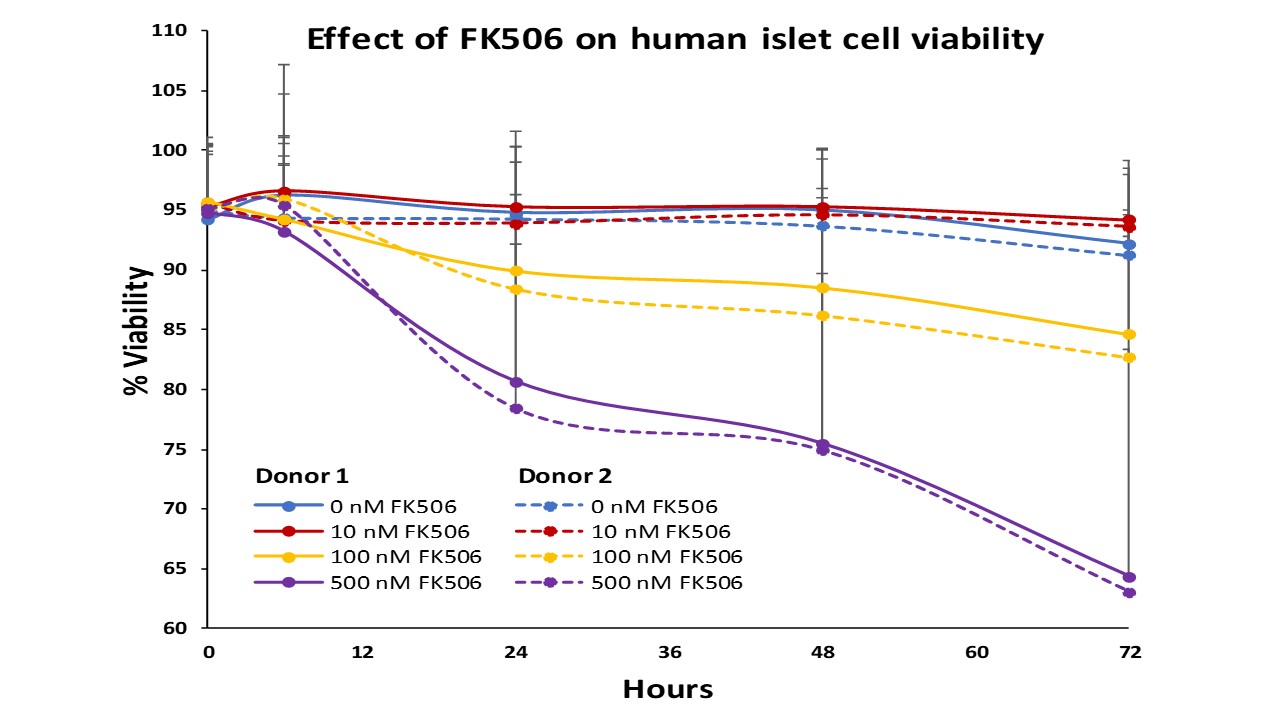Tacrolimus Induces Dedifferentiation of Pancreatic Beta Cells by Inhibition of Calcineurin/NFATc2 and Islet Cell Differentiation Genes
1Baylor University, Dallas, TX, 2Baylor University Medical Center, Dallas, TX, 3Baylor University, Waco, TX, 4Baylor University Medical Ctr, Dallas, TX
Meeting: 2022 American Transplant Congress
Abstract number: 1182
Keywords: Calcineurin, Immunosuppression, Islets, Transcription factors
Topic: Clinical Science » Pancreas » 65 - Pancreas and Islet: All Topics
Session Information
Session Name: Pancreas and Islet: All Topics
Session Type: Poster Abstract
Date: Sunday, June 5, 2022
Session Time: 7:00pm-8:00pm
 Presentation Time: 7:00pm-8:00pm
Presentation Time: 7:00pm-8:00pm
Location: Hynes Halls C & D
*Purpose: Tacrolimus (FK506) is a potent immunosuppressant widely used for solid organ transplantation to prevent lymphokine gene expression by inhibiting calcineurin (CN) and its downstream target nuclear factor of activated T cells (NFAT) but has several adverse side effects including beta cell toxicity which can result in post-transplant diabetes. The objective of this study was to identify mechanisms by which FK506 exposure results in loss of islet beta-cell function.
*Methods: Human islets isolated from donor pancreases were exposed to FK506 and assessed for toxicity, function, and effects on gene expression. FDA/PI staining was used to assess islet viability. RNA-Seq identified genes affected by exposure to FK506. Transgenic mice were used for beta-cell knock out in islets. Gene expression was analyzed by QPCR and western blot. Flow cytometry analysis was used to track RFX6 expression and beta/alpha cell populations. Promoter-reporter and ChIP assay were used to assess components of CN/NFATc2 signaling. ELISA was used to measure GSIS.
*Results: Islets exposed to FK506 (10-100 nM) did not affect islet viability for up to 72 h. RNA-Seq analyses indicated downregulation of several beta-cell differentiation genes and upregulation of beta-cell “disallowed” genes. Inhibition of CN in human islets by FK506 and beta-cell specific knock out of the NFATc2 gene in mouse islets resulted in loss of early differentiation factor RFX6. CN/NFATc2 signaling was required to regulate RFX6 expression to maintain islet cell differentiation and function. Isoxazole 9 (ISX9) was shown to restore CN/NFAT-dependent expression of RFX6, increase the beta-to-alpha islet cell ratio, and improve islet cell function both in vitro and in a nude mouse transplant bioassay.
*Conclusions: Exposure of islets to FK506 and inhibition of NFATc2 results in beta-cell dedifferentiation and loss of function. This is due in part to dysregulation of the early beta-cell differentiation gene RFX6 which is required to maintain beta-cell identity and function. CN/NFATc2 signaling and RFX6 can be restored in beta cells by ISX9 via increasing the beta cell population in islets. Overall, these data indicate that CN/NFAT signaling can be targeted to improve islet function and reverse diabetes in multiple applications of islet cell replacement therapy.
To cite this abstract in AMA style:
Darden CM, Vasu S, Mattke J, Liu Y, Naziruddin B, Lawrence MC. Tacrolimus Induces Dedifferentiation of Pancreatic Beta Cells by Inhibition of Calcineurin/NFATc2 and Islet Cell Differentiation Genes [abstract]. Am J Transplant. 2022; 22 (suppl 3). https://atcmeetingabstracts.com/abstract/tacrolimus-induces-dedifferentiation-of-pancreatic-beta-cells-by-inhibition-of-calcineurin-nfatc2-and-islet-cell-differentiation-genes/. Accessed March 2, 2026.« Back to 2022 American Transplant Congress

